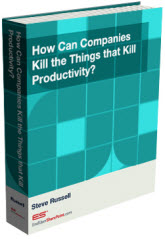SharePoint Search as the Universal Interface
 Listening to Peter Morville, SearchPatterns.org, deliver the keynote at KMWorld two weeks ago changed the way I think about interface design. I speak a lot at conferences, usually floating in and out of sessions just to get a taste of what’s going on, but Peter’s talk stopped me in my tracks.
Listening to Peter Morville, SearchPatterns.org, deliver the keynote at KMWorld two weeks ago changed the way I think about interface design. I speak a lot at conferences, usually floating in and out of sessions just to get a taste of what’s going on, but Peter’s talk stopped me in my tracks.
From my perspective, his entire approach was new. I’m including some of my notes from from his talk below, but what stood out for me was thinking about search as the universal user interface. We are finding ways to access information in SharePoint through integrated systems, taxonomy, federated search and information architecture, but if that information is not presented in a usable, personally configurable, relevant context, the end user becomes overwhelmed with data, not information.
I found it enlightening to hear how all of this information might be harnessed into something relevant and useful, without talk of any specific technology. Just search. When the results set is returned, how is it displayed on the page? Just that simple.
How is it, the results of the search, displayed on the page.
If done properly, interface design of search results begins a process of discovery, not a single answer to a question. Lots to think about there.
Notes from KMWorld Keynote by Peter Morville
“Whoever draws the best picture, gets the funding!”
“Using a tabbed interface (for search results) is not intuitive. When the same results are moved to panels on the right hand side, usage exploded.”
“Blur the link between searching and browsing… LandsEnd.com as an example.”
“Return the results as multiple classes: Images, text, videos, etc.)”
View Peter’s slidedeck below.
The deck below introduces Peter’s new book, Search Patterns: Design for Discovery. I’ll be one of the first to grab it when it becomes available.








Great slideshows, but the heading is a bit misleading. “Search as Universal Interface”, yes, but no mention of “SharePoint Search”. If there was a good explanation of how to use that tool to implement the ideas presented, this would have been a particularly outstanding article.